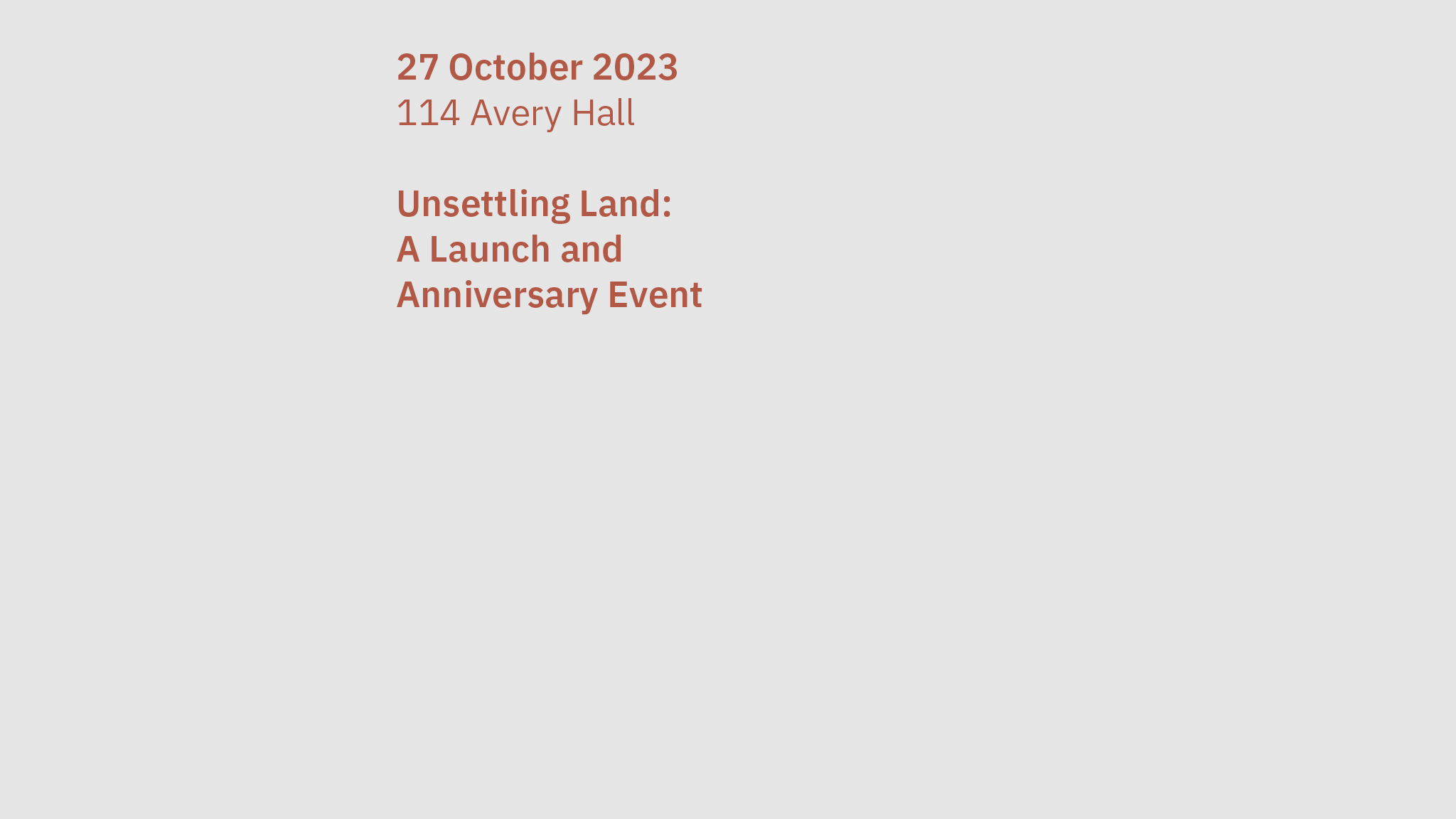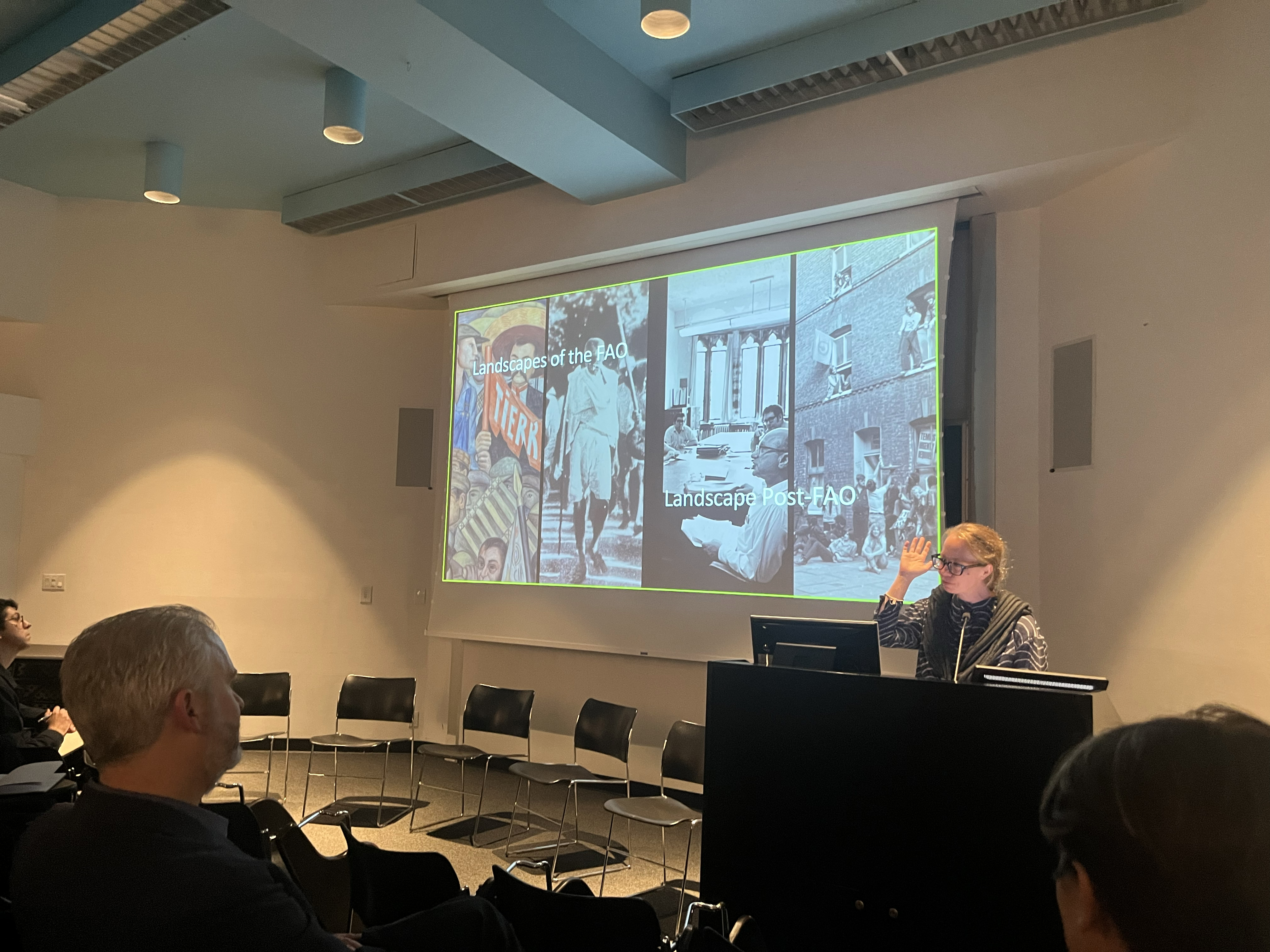
October 27, 3-6:30 pm EST
114 Avery Hall & Buell Hall (3rd Floor), Columbia GSAPP
The Buell Center invites you to an afternoon celebrating the culmination of three interrelated timelines: a book launch capstoning the “Architecture and Land” series; the opening of “100 Links,” an installation in collaboration with AD–WO at the Chicago Architecture Biennial; and a toast to 40 years of the Buell.
The event, "Unsettling Land," will host several conversations and presentations on the long history of settlement, its tools and its architectures, its struggles and its solidarities. Speakers will include: Jo Guldi (Emory) and Timothy Hyde (MIT), with responses from Aleksandr Bierig (U Toronto) and Manu Karuka (Barnard), as well as Buell Director Lucia Allais, Emanuel Admassu (AD–WO), and Jeremiah Hulsebos-Spofford and Andrew Schachman (Floating Museum). The event will conclude with a celebratory reception at Buell Hall, with former Buell directors as guests of honor.
Copies of Architecture and Land in and out of the Americas will be available on-site at no cost, marking the booklet’s debut in New York City, ahead of its Chicago launch on November 1.
Program:
3 PM: Work in Progress Talk
Timothy Hyde, “Eldorado Gothic,” with a response by Manu Karuka
114 Avery Hall
The Ames shovel is a tool of global settlement if there ever was one. In this talk, Hyde follows the shovel from the construction industry of New England to the mining camps of Gold Rush-era California, and from there to the historiographic propositions of Harold Kirker. Kirker’s architectural histories of California reveal a mineralogical conception of architecture, motivated not by materiality but by valuation.
4 PM: Keynote Lecture
Jo Guldi, “The Long Land War,” with a response by Aleksandr Bierig
114 Avery Hall and streaming on Zoom.
Land redistribution schemes have peppered the history of the globe over the last 150 years, with deep repercussions on how and why architecture built nations and fueled transnational imaginaries. Guldi’s book The Long Land War (Yale, 2022) is the first synthetic account of the global struggle for occupancy rights during this period. Guldi traces its origins in the Irish Land War starting 1879 and highlights moments in its later unfolding: from economic theorizations of squatting, to the ambitious plan for a “soil map of the world,” to the inventions of tools for participatory politics. This history affirms the possibility for an alternate conception of the built environment, one where land rights are based not in acts of private property, but on the fact of occupancy.
5:30 PM: Launch: Architecture and Land Book; This is a Rehearsal Biennial; 100 Links Installation
Lucia Allais, Buell Center
Emanuel Admassu, AD–WO
Jeremiah Hulsebos-Spofford and Andrew Schachman, Floating Museum
114 Avery Hall
Buell Director Allais will present a booklet capping two years of research and conversations; Admassu will discuss a Buell/AD–WO installation that reinterprets Gunters’ chains and corner mounds as tools of colonization; and curators from the Floating Museum will present their theme for the Chicago Architecture Biennial, “This is a Rehearsal”, which calls for temporary architectural exhibitions to engage with the ongoing spatial struggles of their host cities.
6:30 Toast to 40 Years of the Buell
A festive celebration of the 40 years since the founding of the Temple Hoyne Buell Center for the Study of American Architecture, in 1983, with former directors in attendance!
Buell Hall 300S & 300E (Third Floor)
Speakers:
Timothy Hyde is a historian of architecture whose research focuses on the political dimensions of architecture from the eighteenth century to the present, with a particular attention to relationships of architecture and law. His most recent book Ugliness and Judgment: On Architecture in the Public Eye (Princeton University Press, 2019) explores episodes in aesthetic debates on architecture and ugliness in Great Britain over the past three centuries and reveals the ways in which architectural discourse participated in the legal formulations of social techniques of the modern city. He is also the author of Constitutional Modernism: Architecture and Civil Society in Cuba, 1933-1959 (University of Minnesota Press, 2012) which examines the entanglements of architecture, planning, and law in the years leading up to and following from the promulgation of a new Cuban constitution in 1940.
Manu Karuka is an Assistant Professor of American Studies, and affiliated faculty with Women’s, Gender & Sexuality Studies at Barnard College, where he has taught since 2014. His work centers a critique of imperialism, with a particular focus on anti-racism and Indigenous decolonization. He teaches courses on the political economy of racism, U.S. imperialism and radical internationalism, Indigenous critiques of political economy, and liberation. He is the author of Empire’s Tracks: Indigenous Nations, Chinese Workers, and the Transcontinental Railroad (University of California Press, 2019). With Juliana Hu Pegues and Alyosha Goldstein he co-edited a special issue of Theory & Event, “On Colonial Unknowing,” (Vol. 19, No. 4, 2016) and with Vivek Bald, Miabi Chatterji, and Sujani Reddy, he co-edited The Sun Never Sets: South Asian Migrants in an Age of U.S. Power (NYU Press, 2013).
Jo Guldi completed her PhD in History at the University of California, Berkeley (2008) and is currently Professor (in Practice) of Quantitative Theory and Methods at Emory University. Previously, Dr. Guldi held positions mainly in Departments of History at the University of Chicago, the Harvard Society of Fellows, Brown University, and Southern Methodist University. Dr. Guldi's research into quantitative methods focuses on improving AI approaches to understanding our past. Her historical research concerns the history of property rights, the origins of eminent domain, and the story of rent control. Her articles have been published in the American Historical Review, Journal of Modern History, and Annales. From 2015-2021 she was PI of a $1 million NSF grant entitled "The Unaffordable World." Her award-winning books have been covered in The Atlantic Monthly, Wall Street Journal, Boston Review, and Guardian.
Aleksandr Bierig studies eighteenth- and nineteenth-century urban and architectural history, with a focus on interactions between the built environment, the natural environment, and political economy in Britain and its empire. He is currently working on a book that examines the architecture, infrastructure, and culture of coal use in Britain between 1700 and 1849. He is also a contributing researcher for the Architecture and Land in and out of the Americas project at the Buell Center. In January 2024, he will join the Daniels Faculty of Architecture, Landscape, and Design at the University of Toronto as an Assistant Professor.
Lucia Allais is a historian of architecture in the modern period and the director of the Temple Hoyne Buell Center for the Study of American Architecture. Her first book, Designs of Destruction, traced the internationalization of “monuments” through a history of various schemes to salvage collections of buildings from destructive scenarios in the middle of the 20th Century. She also writes on the history of architectural knowledge, the architecture of global institutions, and on the science of architectural materials. Allais is Associate Professor of Architecture at Columbia, a member of Aggregate, and an editor of Grey Room.
Emanuel Admassu is an artist, architect, and educator. He is founding partner of AD—WO and assistant professor at Columbia University’s Graduate School of Architecture, Planning, and Preservation; where he teaches design studios and theory seminars in urban design and architecture. He has previously taught at Rhode Island School of Design and Harvard University’s Graduate School of Design. AD—WO’s work is part of the permanent collection of the Art Institute of Chicago and the High Museum of Art in Atlanta. Admassu’s art, design, and teaching practices operate at the intersection of design theory, spatial justice, and contemporary African art.
Jeremiah Hulsebos-Spofford is a visual artist and assistant professor of sculpture at Indiana University Northwest. He is also a co-director and founder of the collective Floating Museum. His work has been shown at the American Academy of Arts and Letters, The UCSD Art Gallery, The Glass Curtain Gallery, and The Hyde Park Art Center, among other spaces. He has held fellowships at the Sculpture Space, the MacDowell Colony, Vermont Studio Center, the Brown Foundation Program at the Dora Maar House, and the Skowhegan School of Sculpture and Painting. His work has been supported by grants from the Foundation for Contemporary Arts, the Harpo Foundation, the Propeller Fund, the Chauncey and Marion Deering McCormick Foundation, an Illinois Arts Council Fellowship, and a Fulbright Fellowship in Sicily.
Andrew Schachman designs environments, infrastructures, and installations. He is the executive co-director of two organizations that are experimental spaces for delivering arts and culture within existing metropolitan networks: Floating Museum and Fieldwork Collaborative Projects. Trained as an architect, he designed and managed projects for the offices of Zaha Hadid, Perkins and Will, Carol Ross Barney, and Doug Garofalo. His projects have received numerous awards including the Distinguished Building Award from the American Institute of Architects and the Richard H. Driehaus Foundation Award for Architectural Excellence in Community Design. As Principal of Studio Andrew Schachman, he completed the design for the Palais de Tokyo’s exhibition, Singing Stones, in the roundhouse of the DuSable Museum of African American History in Chicago. Schachman is a lecturer in urban design at the University of Chicago.



Work in Progress Talk: Timothy Hyde
Keynote Lecture: Jo Guldi